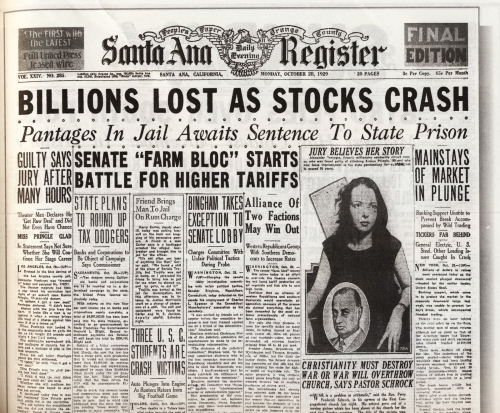The Great Depression originated in the United States and began on October 29, 1929, following the crash of the U.S. stock market, but quickly spread to Europe and the rest of the world.
Thousands of people lost nearly the entire value of their investments, leaving them with next to nothing. At Black Tuesday, the DJIA dropped 12%, marking the start of the great depression. International trade declined, along with personal income, tax revenues and product prices.
As stock prices plummeted with no hope of recovery, panic struck. Masses and masses of people tried to sell their stock, but no one was buying. The stock market, which had appeared to be the surest way to become rich, quickly became the path to bankruptcy.
And yet, the Stock Market Crash was just the beginning. Since many banks had also invested large portions of their clients' savings in the stock market, these banks were forced to close when the stock market crashed. Seeing a few banks close caused another panic across the country. Afraid they would lose their own savings, people rushed to banks that were still open to withdraw their money. This massive withdrawal of cash caused additional banks to close. Since there was no way for a bank's clients to recover any of their savings once the bank had closed, those who didn't reach the bank in time also became bankrupt.
Businesses and industry were also affected. Having lost much of their own capital in either the Stock Market Crash or the bank closures, many businesses started cutting back their workers' hours or wages. In turn, consumers began to curb their spending, refraining from purchasing such things as luxury goods. This lack of consumer spending caused additional businesses to cut back wages or, more drastically, to lay off some of their workers. Some businesses couldn't stay open even with these cuts and soon closed their doors, leaving all their workers unemployed.
The Great Depression lasted until the late 1930s or middle 1940s. It was the longest, most widespread, and deepest depression of the 20th century.

Thousands of people lost nearly the entire value of their investments, leaving them with next to nothing. At Black Tuesday, the DJIA dropped 12%, marking the start of the great depression. International trade declined, along with personal income, tax revenues and product prices.
As stock prices plummeted with no hope of recovery, panic struck. Masses and masses of people tried to sell their stock, but no one was buying. The stock market, which had appeared to be the surest way to become rich, quickly became the path to bankruptcy.
And yet, the Stock Market Crash was just the beginning. Since many banks had also invested large portions of their clients' savings in the stock market, these banks were forced to close when the stock market crashed. Seeing a few banks close caused another panic across the country. Afraid they would lose their own savings, people rushed to banks that were still open to withdraw their money. This massive withdrawal of cash caused additional banks to close. Since there was no way for a bank's clients to recover any of their savings once the bank had closed, those who didn't reach the bank in time also became bankrupt.
Businesses and industry were also affected. Having lost much of their own capital in either the Stock Market Crash or the bank closures, many businesses started cutting back their workers' hours or wages. In turn, consumers began to curb their spending, refraining from purchasing such things as luxury goods. This lack of consumer spending caused additional businesses to cut back wages or, more drastically, to lay off some of their workers. Some businesses couldn't stay open even with these cuts and soon closed their doors, leaving all their workers unemployed.
The Great Depression lasted until the late 1930s or middle 1940s. It was the longest, most widespread, and deepest depression of the 20th century.


